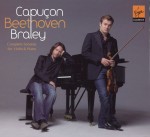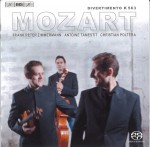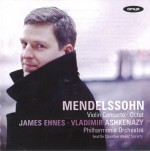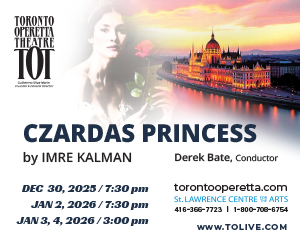 Despite his undisputed talents, I’ve always been a bit unsure of how I feel about the playing of the French violinist Renaud Capuçon. When I first started listening to his new 3-CD set of the Beethoven - Complete Sonatas for Violin & Piano with Frank Braley (Virgin Classics 9 64200 1) I didn’t think that was going to change, but I was wrong. True, the early Op.12 sonatas do seem to get off to a lacklustre start, but Capuçon and Braley have been working on this project for 14 years, and it soon shows. The second CD opens with a beautiful reading of the “Spring” sonata, and the quality never lags. There’s a terrific No.7 - the C minor - and a marvellous “Kreutzer”, with a particularly superb opening movement. Throughout, tempos seem perfectly judged, and there’s a wonderful range of dynamics. The balance feels a bit uneven at first, with the piano possibly a bit far back, but it actually enables the individual players to be clearly heard, and their obvious understanding to emerge. And what an understanding it is. I realized I didn’t know some of these sonatas as well as I thought; this outstanding set is a tremendous and welcome way to put that right.
Despite his undisputed talents, I’ve always been a bit unsure of how I feel about the playing of the French violinist Renaud Capuçon. When I first started listening to his new 3-CD set of the Beethoven - Complete Sonatas for Violin & Piano with Frank Braley (Virgin Classics 9 64200 1) I didn’t think that was going to change, but I was wrong. True, the early Op.12 sonatas do seem to get off to a lacklustre start, but Capuçon and Braley have been working on this project for 14 years, and it soon shows. The second CD opens with a beautiful reading of the “Spring” sonata, and the quality never lags. There’s a terrific No.7 - the C minor - and a marvellous “Kreutzer”, with a particularly superb opening movement. Throughout, tempos seem perfectly judged, and there’s a wonderful range of dynamics. The balance feels a bit uneven at first, with the piano possibly a bit far back, but it actually enables the individual players to be clearly heard, and their obvious understanding to emerge. And what an understanding it is. I realized I didn’t know some of these sonatas as well as I thought; this outstanding set is a tremendous and welcome way to put that right.
 You only have to listen to Mozart’s string quintets to appreciate that the string quartet does not have sole claim to the ‘perfect string family’ designation, and the same composer’s Divertimento in E flat K563, for Violin, Viola and Cello, proves conclusively that ‘one less’ can be just as satisfying as ‘one more’. Violinist Frank Peter Zimmermann only formed the Trio Zimmermann with violist Antoine Tamestit and cellist Christian Poltera in 2007, but their playing on this Super Audio CD (BIS-SACD-1817) is simply remarkable; you would think they had spent a lifetime playing together. Despite its title, this Divertimento is a large-scale string trio. A mature work from 1788, its 6-movement structure follows that of the whimsical Divertimento popular in Vienna at the time, but musically and emotionally it’s in a different world. The Mozart scholar Alfred Einstein went so far as to call this work “the most perfect and the finest that has ever manifested itself in this world.” Listening to this enthralling and beautifully recorded performance, it’s hard to disagree. Schubert’s String Trio in B flat, D471 – actually a single Allegro opening movement for a work started and abandoned in 1816 – completes a marvellous CD.
You only have to listen to Mozart’s string quintets to appreciate that the string quartet does not have sole claim to the ‘perfect string family’ designation, and the same composer’s Divertimento in E flat K563, for Violin, Viola and Cello, proves conclusively that ‘one less’ can be just as satisfying as ‘one more’. Violinist Frank Peter Zimmermann only formed the Trio Zimmermann with violist Antoine Tamestit and cellist Christian Poltera in 2007, but their playing on this Super Audio CD (BIS-SACD-1817) is simply remarkable; you would think they had spent a lifetime playing together. Despite its title, this Divertimento is a large-scale string trio. A mature work from 1788, its 6-movement structure follows that of the whimsical Divertimento popular in Vienna at the time, but musically and emotionally it’s in a different world. The Mozart scholar Alfred Einstein went so far as to call this work “the most perfect and the finest that has ever manifested itself in this world.” Listening to this enthralling and beautifully recorded performance, it’s hard to disagree. Schubert’s String Trio in B flat, D471 – actually a single Allegro opening movement for a work started and abandoned in 1816 – completes a marvellous CD.
 When I saw that the latest CD from Canadian violin sensation James Ehnes was the Mendelssohn Violin Concerto (ONYX 4060), my first thought was “Do we really need another recording of probably the most popular - and most frequently recorded – concerto in the repertoire?” Well as it turns out, yes, we do. The Mendelssohn is also probably the most perfect of all violin concertos, and simply can’t be avoided by any player who reaches the top rank. The real challenge, of course, is not to try to find “something new to say,” but to find the best way of simply letting the music speak for itself. This CD reunites Ehnes with the Philharmonia Orchestra, partners in his 2007 recording of the Elgar concerto, but this time with Vladimir Ashkenazy conducting. The qualities most often mentioned in Ehnes reviews – his impeccable technique and sumptuous tone – are fully evident here in another top-notch performance. Ehnes joins forces with members of the Seattle Chamber Music Society for a terrific performance of the Octet Op.20, a simply astonishing work written for double string quartet when Mendelssohn was only 16. Both performances were recorded live in concert, the concerto – with an occasionally muddy orchestral sound - at the Warwick Arts Centre in the UK, and the Octet at Benaroya Hall in Seattle.
When I saw that the latest CD from Canadian violin sensation James Ehnes was the Mendelssohn Violin Concerto (ONYX 4060), my first thought was “Do we really need another recording of probably the most popular - and most frequently recorded – concerto in the repertoire?” Well as it turns out, yes, we do. The Mendelssohn is also probably the most perfect of all violin concertos, and simply can’t be avoided by any player who reaches the top rank. The real challenge, of course, is not to try to find “something new to say,” but to find the best way of simply letting the music speak for itself. This CD reunites Ehnes with the Philharmonia Orchestra, partners in his 2007 recording of the Elgar concerto, but this time with Vladimir Ashkenazy conducting. The qualities most often mentioned in Ehnes reviews – his impeccable technique and sumptuous tone – are fully evident here in another top-notch performance. Ehnes joins forces with members of the Seattle Chamber Music Society for a terrific performance of the Octet Op.20, a simply astonishing work written for double string quartet when Mendelssohn was only 16. Both performances were recorded live in concert, the concerto – with an occasionally muddy orchestral sound - at the Warwick Arts Centre in the UK, and the Octet at Benaroya Hall in Seattle.
 It’s somewhat surprising that the Ysaÿe Six Sonatas for Solo Violin Op.27 aren’t better known. Eugène Ysaÿe – a colossus of a performer, in all respects - is often referred to as the first ‘modern’ violinist, and the sonatas, written in 1923 when he was 64, not only summed up the polyphonic achievements of the preceding 200 years but also introduced new techniques that were to influence the solo works of Bartok, Hindemith and Prokofiev. Each sonata is dedicated to – and reflects the character of – a colleague of Ysaÿe’s: Joseph Szigeti; Jacques Thibaud; George Enescu; Fritz Kreisler; Mathieu Crickboom; and Manuel Quiroga. Consequently, they differ greatly in form and content, but this simply makes the startling originality and individuality of these remarkable works even more apparent. Perhaps surprisingly, given their fiendish difficulty, the sonatas have been well served on CD, albeit by few of the really elite performers. The Swiss violinist Rachel Kolly D’Alba provides all that you could possibly ask for on Passion Ysaÿe (Warner WCJ 2564 68385-5), combining a dazzling technique with a sensitivity and artistry that earned her the stamp of approval from Jacques Ysaÿe, the composer’s grandson.
It’s somewhat surprising that the Ysaÿe Six Sonatas for Solo Violin Op.27 aren’t better known. Eugène Ysaÿe – a colossus of a performer, in all respects - is often referred to as the first ‘modern’ violinist, and the sonatas, written in 1923 when he was 64, not only summed up the polyphonic achievements of the preceding 200 years but also introduced new techniques that were to influence the solo works of Bartok, Hindemith and Prokofiev. Each sonata is dedicated to – and reflects the character of – a colleague of Ysaÿe’s: Joseph Szigeti; Jacques Thibaud; George Enescu; Fritz Kreisler; Mathieu Crickboom; and Manuel Quiroga. Consequently, they differ greatly in form and content, but this simply makes the startling originality and individuality of these remarkable works even more apparent. Perhaps surprisingly, given their fiendish difficulty, the sonatas have been well served on CD, albeit by few of the really elite performers. The Swiss violinist Rachel Kolly D’Alba provides all that you could possibly ask for on Passion Ysaÿe (Warner WCJ 2564 68385-5), combining a dazzling technique with a sensitivity and artistry that earned her the stamp of approval from Jacques Ysaÿe, the composer’s grandson.



